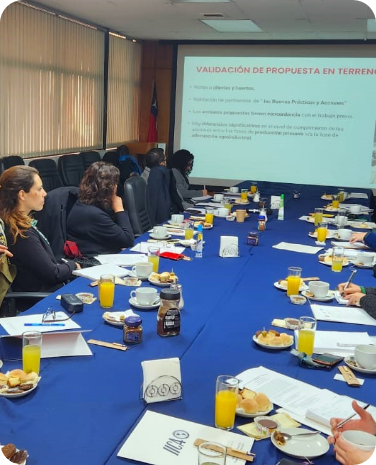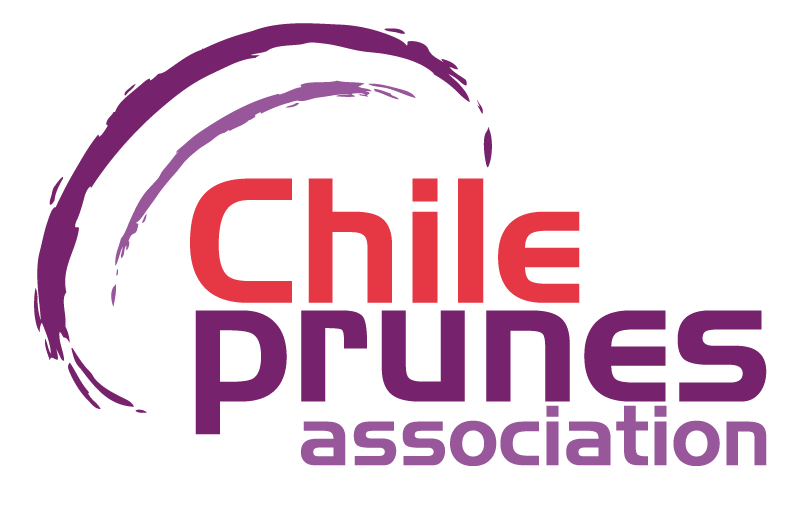The meeting was attended by Pro-Chile, Odepa, Fundación para la Innovación Agraria, Ciruelas Chile and the Sustainability and Climate Change Agency.
Hosted by IICA and Chileprunes, the meeting of the Steering Committee was held in the offices of the Ministry of Agriculture to present the progress of the project and the proposed standards for the industry, one year after its inception. The meeting was attended by Pro-Chile, Odepa, Fundación para la Innovación Agraria, Ciruelas Chile and the Sustainability and Climate Change Agency.
On the occasion, Pedro Acuña, Executive Director of Chileprunes, presented the video of the project, prepared to show the productive phase of the process and elaboration of the dehydrated plum. He also gave an account of the achievements reached during the first stage of the project.
Progress, agreements and adjustments
After mentioning the importance of international markets, he was optimistic about the current situation and the first 12 months of work: “After 1 year of diagnosing the design of the standards, there is a 16-month road ahead. This is the first stage of 4 and we are happy with the progress made, because we know that there is always room for improvement”.
The first year was one of progress, agreements and adjustments. It included surveys, a benchmark and two proposals for standards with contributions from the different stakeholders in the sector, and thanks to this work, 5 dimensions and 13 topics were defined and translated into good practices.
After 2 months of adjustments and a valuable field praxis, the validation of the drafts made it possible to adjust the standard, add new elements and remove others. We visited partners and toured process plants and visited three different categories of farms supplying the industry: small, large and medium-sized. Currently, the possibility of validation with other standards is being reviewed and the certification model is being adjusted.
Validation of the proposal in the field
Based on the work carried out, the technical team proposed two sustainability standards, one for each stage of the value chain, comprising 153 actions for primary production and 137 for agroindustrial adaptation. Likewise, the standard is proposed as a voluntary, simple and flexible instance, feasible to be applied by different types of companies.
There are no mandatory actions; each company defines which actions it wishes to include in its certification process in order to advance in sustainability.
Thanks to the methodical analysis of what was observed during the field work, the team was able to identify some technical gaps in the industry, which will be addressed in greater depth in the next stage of piloting with companies in the sector. A training and support plan is being considered that will enable them to close these gaps and make progress in sustainability.
Recognition and positive impressions
The presentation of the standard to its stakeholders generated many constructive impressions and support for its management. Starting with the representative of FIA, Marcela Samarotto, who focused on the advances that the standard can offer at the technological level.
IICA’s representative in Chile, Hernán Chiriboga, highlighted the leadership of the certification at world level and the smooth public-private partnership behind the project.
The Agency for Sustainability and Climate Change, ASCC, which played a key role in the development of the project, was present with its Executive Director, Ximena Ruz, who positively highlighted the self-taught quality of the work carried out.
Jesús de la Riva, President of Ciruelas Chile, commented on his group’s active commitment to sustainability and highly valued the coordination between the public and private sectors. The latter was also recognized by Lorena Sepúlveda, National Director of Pro-Chile.
To end the round of impressions, the floor was given to Daniela Acuña, Deputy Director of ODEPA, who stressed the importance of adding small farmers and including new sectors in the Chile Origen Consciente program.
Next steps: piloting and training
In summary, the invitation is for companies in the sector to join this unique experience in Chile and a pioneer in the world. An open call to participate in the next steps of this piloting of the standards, which will be carried out during a period of 4 months, to identify the technical gaps of the industry and, by virtue of that, to be able to propose a training plan adjusted to what both the small and medium, as well as the large industry, need to improve.
So, if you are a producer of the guild, you want to join the piloting activity and you are interested in knowing what this sustainability standard offers; check the cover of our Newsleetter “Road to Sustainability” and in the lower section, at the bottom of the cover, you will find the link to access the registration form. There is still time and you are still welcome.



